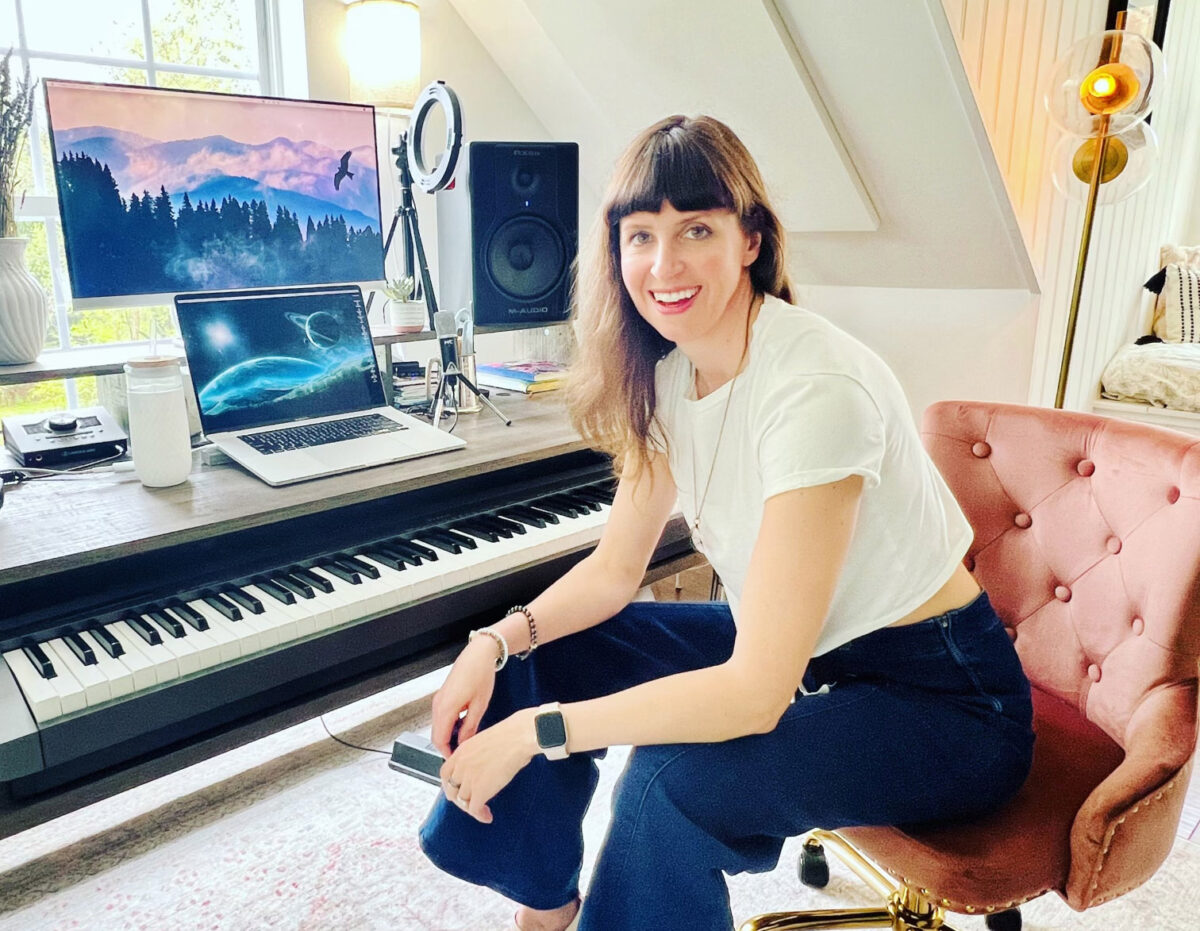
New Paltz resident Cheryl B. Engelhardt was 2 1/2 years old when her parents took her to her first live music event, a piano concert. The toddler sat mesmerized and wanting to hear the music without distraction, put a chubby finger to her lips and shushed the people around her.
A few decades later, she’s Grammy-nominated for Best New Age, Ambient or Chant Album.
Engelhardt’s love of music continued through high school and into college at Cornell University, where she majored in marine biology. She took music classes as electives, but her advisor pointed out she almost had enough credits for a double major. Engelhardt only took one marine biology job after graduation, and since then her career has been all about music.
Before she became a New Age artist, Engelhardt was more of a singer-songwriter, a “Sarah Bareilles meets Alanis Morissette meets Cheryl Crow” type, in her description. She put out four albums, toured, played house concerts and ski resorts and worked on film scores.
But then she got a composer residency in Greece, which spurred a shift to experimental piano music. It was there that she made “Luminary,” her first New Age album.
Engelhardt wanted to work out some anxiety, grief and other emotional residue from her father’s death a few years prior, and the intention was to make music, not an album per se. But by the time the residency ended, she had 10 tracks that worked together.
“The first tracks are a little busy and dark, and then they slowly unravel, slow down, and turn more positive,” Engelhardt said. “Each track latched onto some sort of emotion — anxiety, sadness — and I realized that’s what I needed to help me with my meditation and processing.”
Typical meditation music was either too simplistic or too melodic for Engelhardt.
“I found I wasn’t doing what I was supposed to be doing during meditation, which was look at what I needed to look at in myself,” Engelhardt said. “So I thought, what if I could have the music help you latch on, help with focus, keep you present?”
It worked. “Luminary” was released and shot to the top of the New Age charts on Amazon and iTunes, doing much better than any of her pop albums. Engelhardt said she laughed and asked herself, “Am I a New Age artist now?”
The answer was yes, and Engelhardt now confidently describes herself as an “edgy Enya.” Engelhardt quickly followed up with another New Age album, “A Seeker’s Slumber,” which also did well, before she arrived at the place where she composed and recorded “The Passenger.”
While “The Passenger” was born from a deeply emotional place, it wasn’t recorded in any one physical place. The music was written by Engelhardt in a roomette on Amtrak as she traveled between New York and Los Angeles. She’d planned to attend the 2022 Grammys with her best friend and collaborator, Kevin Archambault, but then the Grammys were postponed and Archambault died from cancer. Engelhardt decided to go anyway, not for the award ceremony and not with her friend, but maybe to compose an album. She thought that nobody had ever made a record on a cross-country train trip, and she wondered if she could.
By the time Engelhardt reached Los Angeles, she’d cried over the loss of Archambault while also being moved to tears by the natural beauty — the full moon, hundreds of elk, the frozen Colorado River — that she witnessed on the journey. Engelhardt traveled with a mini keyboard, laptop and headphones — essentially a mobile recording studio — and after crossing the country, she’d recorded 12 tracks, nine of which would become “The Passenger.”
On the return trip, Engelhardt worked on edits and reached out to collaborators such as Lili Haydn, Sangeeta Kaur, and Danaë Xanthe Vlasse. A few men perform with the Dallas String Quartet, but other than that “The Passenger” is completely composed, produced, mixed and mastered by women. It was released in April 2022, and quickly became a New Age bestseller on Amazon and iTunes.
Meditation brought Engelhardt to compose New Age music, and it gives her story a perfect arc that she was at a meditation retreat when she found out she’d been nominated for a Grammy.
“A nomination for this project gives extra meaning to a hard time, and highlights again that music does in fact heal when used as a tool for processing,” Engelhardt said.
In 34 years, only two solo female artists have ever won a Grammy in the New Age category. But that didn’t stop Engelhardt from visualizing a win during a two-hour meditation after she heard the news.
You can listen to “The Passenger” on various streaming platforms and follow Engelhardt’s news on her website, Facebook and Instagram.